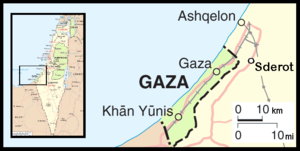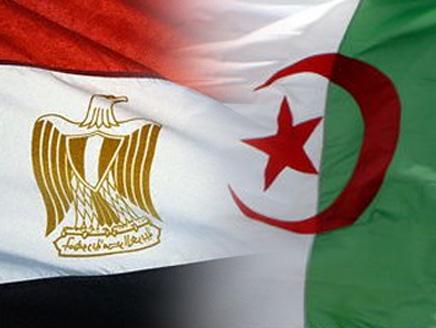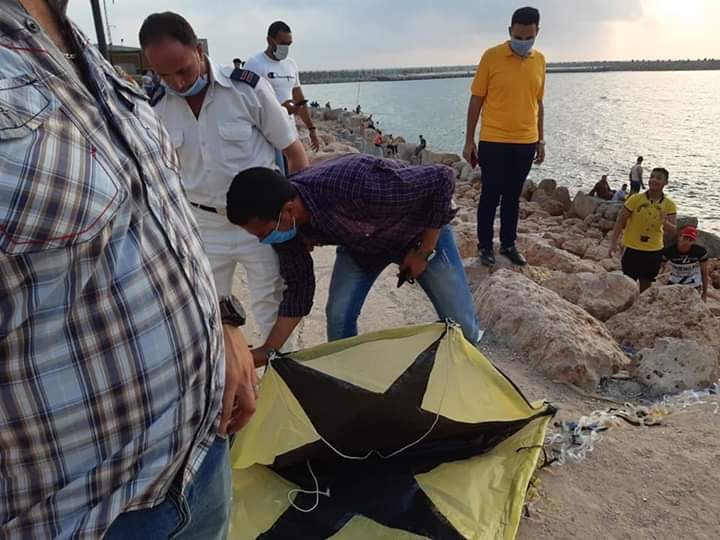The Egyptian state taking the lead of relentless efforts to ceasefire in the conflict evolved between Gaza and Israel. Egypt has differentiated relations with Hamas and Gaza Strip over decades, but Egypt’s mediation has been refused by both Palestinian and Israeli sides. Then, Egypt took several steps to provide health and financial assistance for the reconstruction of Gaza to put pressure on Hamas to cease firing.
We cannot understand the relations between Egypt and Gaza Strip without a closer look at the Egyptian General Intelligence Service and its role in managing the foreign affairs of the Egyptian state. Since the Camp David Accord and the absence of enmity condition with Israel, the Service has been assigned to the mission of Sinai Development. This new status was like sharing spoils after the October War, as the Service’s officers have accumulated fortunes from controlling the tourism industry.
Camp David Window
Over time, numbers of those officers turned into businessmen, some of them ran off the road of enmity and committing to a national position against Israel. This segment formed a network that benefits from the normalization of relations with Israel through direct economic dealings. This network has a steady penetration within the Egyptian state and seized several privileges as loans and lands, all of this passes through the corruption over the 1990s. With the ascendency of Omar Suleiman, this network controlled vast sectors in the Service and eliminated the domination of eagles or weakened their position at least. On the other hand, the second line of officers, even if lacking a national position, were jealous of this benefiting network while they have no economic benefits.
The benefiting network has worked on the economic normalization file as it has been seen as a driver of development by the head of the regime and as an element to overcome the severe economic crisis. Then, this network expanded and ratified the QIZ agreement between Egyptian and Israeli businessmen seeking the formation of compradors that strengthening the economic and political ties between Egypt and Israel. Also, the gas export agreement was concluded and the Egyptian companies’ shares were sold for multinational companies that worked in the same context.
This intelligence network included the Preventive Security Force in Gaza where a network of agents was formed too. Also, the Service domination over the Ministry of Foreign Affairs represented in taking over the office by Ahmed Maher. Besides, it has contributed to the Gaza-Jericho Agreement as a complementary step of the Oslo Accords. This network served as a Trojan Horse to facilitate the Israeli domination over Egypt. At the same time, the military was opening the doors for cooperation with the US. Yet, the military viewed, with great skepticism, the growing power of the network possessed by the Service inside the Egyptian state.
After the Israeli withdrawal from Gaza and the winning of Hamas in the elections, the Service has adopted the Israeli demand to disarm Hamas to protect the economic interests of Israel. Sake of this, the Service contributed to the siege of Gaza to form public pressure on Hamas. After the loss of its ally, the Preventive Security Force in Gaza, Egypt contributed to the prevention of a unified Arab position during the war of 2008-2009. Moreover, it was supporting the military operations of Israel.
Over the siege, the people of Gaza developed the tunnels’ strategy across the borders with Egypt to smuggle foods and commodities to besieged. The Arabs of North Sinai who work in drugs and Service officers managed benefited from these tunnels, as they formed siege-benefiting cartels.
A Common Enemy
The Israelis discussed with Mubarak the importance of flooding the tunnels and constructing a deep iron wall on the borders. From his side, Mubarak approved the plan but he didn’t activate it due to the new lobby that befitted from the tunnels. Also, Mubarak was a participant in the peace negotiations with Washington in Sharm ElSheik, of course, the revolution didn’t give him more time in 2011.
After the ousting of Mubarak and seizing of power by the military, Tantawy has appointed general Murad Mowafi as the chief of the Service. Muwafi was the chief of the Military Intelligence from 2004 to 2010 at the same time of the rise of the Israeli interest network. Muawfi was fully loaded with the anger of Tantawy on the US for giving up on Mubarak, and with accusations against this network to be a cause for the revolution. Then, Muwafi eliminated them from the Service with demands to bring them to justice for corruption, so many of them fled abroad. In this time, the Service let the tunnels work as it was, even more, it participated and turned a blind eye on the transportation of arms to Gaza from Libya and Sudan. The revenge of the officers represented a full shift in the attitude towards Gaza accompanied by public pressure to change the legacy of Mubarak including the terms of the Camp David Accord.
The mandate of Muwafi was an expression of anger represented in targeting the gas pipeline network to Israel until the agreement of gas was canceled. All of this weakened the security system of Sinai, then hundreds of Islamist militants moved there who were used by the Military Council to put pressure on Israel. Also, they were used in domestic politics. As a result, Israel violated and monitored the Sinai sky, and an Israeli provocation represented in the entry of an Israeli submarine into the Nile. The discord reached its edge when Tantawy when he left the Israeli embassy under the protesters’ mercy as the military wanted to change several terms on the Camp David Accord related to the numbers and size of its forces in Sinai.
But the crucial turn in the rise of the eagles and leaders that were not involved in the network of interests under Mubarak, these leaders have good relations with Hamas on one hand, and with the Palestinian Authority on the other hand. Among those officers was Major General Muhammad Rafat Shehata, who was one of the men of the Service itself. Shehata was in charge of the successful negotiations for releasing Gilad Shalit for Palestinian prisoners in 2011. Shehata is considered one of the nationalists of the Service, he expressed his view for the Palestinian cause as he stated that “Whatever efforts made we make, it does not compensate a drop of blood of a Palestinian child. The Palestinian cause is in the heart of every Egyptian until our desired hope for the establishment of the Palestinian state is fulfilled.”
Shehata was appointed chief of the Intelligence Service after the dismissal of Murad Muwafi by the late president Mohamed Morsi. The dismissal of Muwafi was a result of reporting that he turned a blind eye on an operation committed by the terrorist groups in Sinai against the Egyptian army to put pressure on Morsi regime during his conflict with the Military Council.
The Service lost its control over the Ministry of Foreign Affairs, Gaza was considered as an Egyptian integral expansion in Morsi’s policies with more restrictions on the transportation of arms. But, the tipping point was during the Gaza war in November 2012 when the Egyptian regime took steps to stop the war. The Egyptian Prime Minister Hisham Kandil visited Gaza during the war and pledged to provide aid to Gaza, which forced Israel to accept the Egyptian offer, fearing the support that Egypt would provide.
Blocking Tunnels, Opening Channels
After the military coup of July 3rd, the Egyptian Defense Minister, at that time, Abdel Fattah El-Sisi, seized power loaded with pledges to Israel to block the tunnels. As he appointed Mohamed Farid Al-Tohamy, was the chief of Military Intelligence, to be the chief of the General Intelligence Service. Al-Tohamy has downsized the power of nationalist officers and accomplished structural changes in the Service included the cancelation of several files.
Relations with Hamas worsened, and the siege tightened by closing and flooding most of the tunnels. Israel initiated a war for 53 days, taking advantage of this shift from the Egyptian regime to disarm Hamas. At the same time the Egyptian army was carrying out a war of extermination and displacement against the people of Sinai to eradicate the Islamists, and most importantly the Arabs of North Sinai who provided huge facilitations for the besieged of Gaza in trade and the basic food commodities.
Gradually, the Egyptian network of agents has been eroded since throwing the Preventive Security Force out of Gaza, and almost totally lost in the duration from 2014 to 2017. The Israeli narrative of threatening national security was aligned with the Egyptian regime justifications of waging the war on Gaza through tightening the siege and the displacement of the people of Sinai. In November 2014, Egypt called for a reconstruction conference, as Qatar provided one billion dollars, the EU provided 600 million dollars, both the UAE and the US provided 200 million dollars. The total grants were 5.4 billion dollars.
The role of Qatar in supporting the Strip has grown through providing energy supplies, reconstruction materials, and financial grants to the poor and the affected by the war. Conversely, Egypt lost its contact channels with Hamas for Qatar. Egypt preserved some marginal rules, such as preserving some tunnels for smuggling cigarettes and some materials that Service officers profit from, and received more students in Egyptian universities as it was in the past. Also, the opening of the border crossings in coordination with Hamas over far apart periods, this apathy was the main character of the first period of Abdel Fattah El-Sisi’s mandate.
Al-Sisi decided in light of the American boycott and loss in the Gaza file, to rapprochement with Qatar, so he removed Al-Tohamy who was against this rapprochement or going easy with Hamas and appointed Major General Khaled Fawzi, head of the National Security Authority, as chief of the Service. Fawzy was loaded with a desire to restore the internal balances of the Mubarak era, but in the foreign files, he adopted more pragmatic positions when compared with his predecessors. He sought an understanding with Qatar to close the channels that attack the Egyptian regime. As for Gaza, he let electricity generators and equipment used in generating energy pass through the tunnels, in addition to commodities. Fawzy opened a back door with Hamas.
The situation did not last long because of an internal economic conflict that broke out between the service and the military, which is one of its aspects was the Service’s desire to control the economic file of Sinai, which was rejected from the military. At the same time, Egypt participated in the boycott of Qatar in 2017. New channels have been opened with Hamas after announced “the document of general principles and policies “through which Hamas redefines itself as a national resistance movement for the sake of establishing the State of Palestine. Khaled Fawzi visited Gaza Strip with Egyptian media persons, and negotiations were held to open an office for Hamas in Cairo. It seemed that Egypt wants to establish consolidated channels with Hamas instead of Qatar’s possession of the file over the last years. The new channels allowed the political leaders to seek international recognition across the world and to secure funds.
In cooperation with individuals from Gaza, the Service founded Hala for Touristic Services to transport individuals over the crossing for money. Then, the company expanded its activity to supply food commodities to Gaza. A new strategy was initiated to compete with Israel over supplying marginal consumables to Gaza and activating the crossing as a pathway for the economy not only passage.
This move intended to form a beneficiary network in Gaza to work with the Service. Relations with the internal security force also evolved at the same time when talks circulated about the trade of the century, which Egypt has no role to play in it even it, expressed its support on media. Yet, Egypt failed to be an economic partner in this deal. Moreover, the states of normalization headed by the UAE wanted to be replaced with Egypt in the file of Gaza and Palestine cause entirely, through Dahlan as an alternative to Mahmoud Abbas, the paths of economic cooperation, the pursuit of the UAE to classify Hamas as a terrorist group and through the siege of supporting parties as Qatar, ignoring the fact that Egypt was among the affected by the siege of Qatar and its boycott.
The attempt of Return to the Stage
In January 2021, Egypt and Qatar went to reconciliation. The Egyptian move came after the Gulf states left Egypt alone, and negotiated with Qatar. The delay allowed the two sides to open channels regarding the disputed files, specifically Gaza. Egypt negotiated with Hamas and an agreement was concluded to open the crossing from February 3, 2021, until now, and it has not been closed. Delegations from Gaza also visited Cairo to participate in the Palestinian national dialogue patroned by Cairo, and some of them traveled abroad.
Taqadom Al-Khatib, a researcher, indicated that shifts in the file occurred after Major General Ahmed Abdel-Khaleq Shukry was returned to take over the Gaza file after he was excluded from it. Shukry was a member of the reconciliation team between the Authority and the Hamas movement, and according to Takadom, Shoukry has a special view, away from the Egyptian position at the time of his arrival.
Economic movement between the Strip and Egypt has increased, some commodities were smuggled into Gaza, while the Egyptian media stopped calling Hamas a terroristic group. But the obvious shift was during the escalation of the Sheikh Jarrah crisis, despite the delay of the official response. While Sheikh Al-Azhar denounced and condemned the displacement of Jerusalemites first.
The exploitation of the situation was obvious with the beginning of the war against Gaza. It was employed in two vital files, restoring Egypt’s position regionally in the line of normalization for economic and political reasons, and second to employ it in the Renaissance Dam negotiations patroned by the USA.
Egypt tried to ceasefire on the second day of the war, but Israel and Hamas rejected, and it attempted more than once and failed. As a result, it decided to send medical aids, which was delayed until the seventh day and opened the crossing a day earlier than the day specified for that, the opening is in both directions, followed by the issuance of statements of condemnation.
On the seventh day of the war, Egypt opened lines of communication with Qatar, through which it aimed to put pressure on the US, which did not pay much attention to it in the crisis as Blinken refused to contact Shokry. However, the unified position of Egypt and Qatar prevented the pressure on Hamas to stop the rocket fire, it seemed at this moment that Egypt, Jordan, and Qatar are forming a united position in the face of the new normalization countries.
Shoukry stepped up from Egypt’s speech at the third Security Council meeting, and it seemed that Egypt was expressing its strategic importance in protecting Israel’s security and that it did not accept marginalization in this file.
Among the crucial steps taken by Egypt is the high tone of the internal media as an attempt to blackmail Israel and the US. They remind them that the safety of Israel is connected to the survival of the Egyptian regime and the strategic depth of Israel is its surroundings in Egypt and Jordan. Also, they remind them that the threat of public demonstration and flagging the memory of the 2011 revolution
In the same context, El-Sisi offered participation in the reconstruction of Gaza with an amount of 500 million dollars, and he will also encourage the Egyptian companies to contribute to the reconstruction. While some activists point out that the main goal of entering for reconstruction is that Egypt will participate in preventing the Gaza Strip from building the tunnels in which the leaders reside, and storing arms in them, in return to stimulate Hamas to accept ceasing fire.
Analysts may disagree about to which extent Egypt could come back over Gaza file, after years of degradation destroyed all the cards the influence Hamas. But what is sure that these movements brought Egypt back as an international contact channel. Also, it affirmed Egypt’s importance for the security of Israel. However, it is not certain that these moves will be effective in the Renaissance Dam negotiations with Ethiopia.





Recent Comments